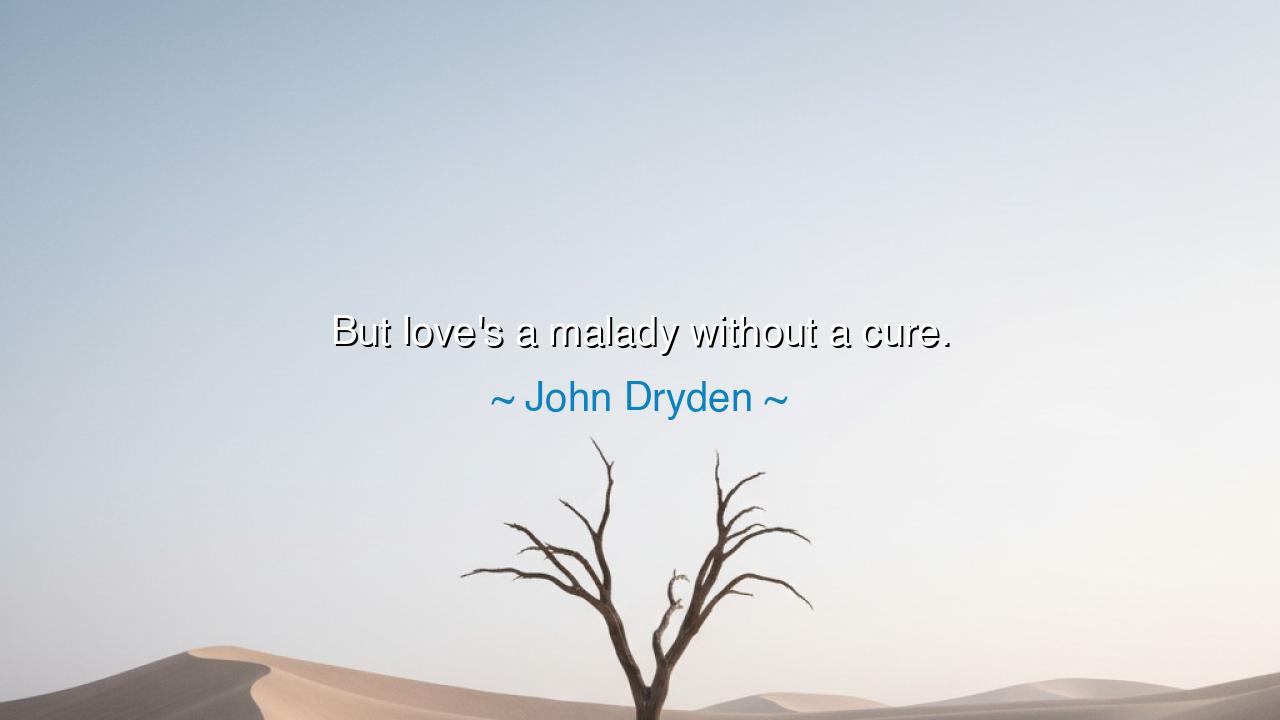
But love's a malady without a cure.






“But love’s a malady without a cure.” — John Dryden
Thus spoke John Dryden, the great poet of England’s Restoration age — a man who understood both the splendor and the sorrow of the human heart. In this haunting line, he names love not as a gentle pleasure, but as a malady, a sickness of the soul that no medicine can heal. Yet within his words there is no bitterness, only truth. For what Dryden calls a malady is not a curse to be feared, but a passion to be endured — an affliction that, once it enters the heart, reshapes one’s being forever. To love is to surrender reason, to become vulnerable, to ache — and yet, to live more fully than ever before.
Dryden lived in an age of wit, elegance, and intellect — a time when poets often dissected love as though it were a logical art. But beneath his refined verse beat the pulse of ancient wisdom: that love is both sweetness and torment, the greatest blessing and the deepest wound. When he says there is no cure, he does not mean that love is hopeless, but that it is eternal — that once the heart has tasted it, it can never return to its former calm. The malady of love is incurable because it awakens a hunger for the infinite, a longing that no mortal comfort can satisfy.
From the earliest times, poets and philosophers have spoken of this strange illness. The Greeks called it eros, a divine madness sent by the gods. Plato wrote that lovers are “wounded by beauty” — pierced by something greater than themselves. The troubadours of medieval France sang of love as both joy and pain, calling it “the sweet sickness.” Dryden’s words continue that ancient lineage, expressing the same eternal truth: love is not an ailment to be cured, but a fire to be carried. Once kindled, it burns on through memory, through absence, through death itself.
Consider the story of Héloïse and Abelard, the scholar and the nun, whose love defied their world and yet cost them everything. Though separated by vow and circumstance, their letters still burn with passion centuries later. Abelard sought peace in philosophy; Héloïse sought solace in prayer — yet neither found relief. Their love remained an unhealed wound, both blessing and burden. It was, as Dryden wrote, a malady without a cure — for true love cannot be extinguished by time, nor replaced by reason. It endures, even when it cannot be fulfilled.
This is why love humbles the proud and elevates the lowly. It strips away the armor of certainty, leaving the heart naked and trembling before something vast. It teaches that we are not masters of our own souls, but servants of a force older than the stars. And though it brings suffering, that suffering is sacred. To be wounded by love is to be touched by the divine — to feel, if only for a moment, the pulse of eternity within one’s veins.
Yet in our age, we often seek to cure love — to manage it, to protect ourselves from its pain. We chase distractions, we retreat into reason, we tell ourselves that feeling too deeply is a weakness. But Dryden’s wisdom cuts through such illusions. Love cannot be cured because it is not a disease of the body — it is the trembling of the soul when it remembers its origin. To try to cure love is to try to silence the very heartbeat of existence.
So, my child of the eternal flame, take this teaching to heart: do not seek to cure love — learn to carry it wisely. When love wounds you, let it awaken compassion; when it burns, let it illuminate. Do not curse your longing; it is proof that you have lived, that your soul still hungers for the divine. Love will bring you both tears and transcendence — accept both as gifts.
For Dryden was right: love’s a malady without a cure. Yet in that very incurability lies its beauty — that we are forever restless, forever reaching, forever alive in the ache of connection. To love is to fall ill with the most glorious sickness of all — one that no cure should ever take away.






AAdministratorAdministrator
Welcome, honored guests. Please leave a comment, we will respond soon